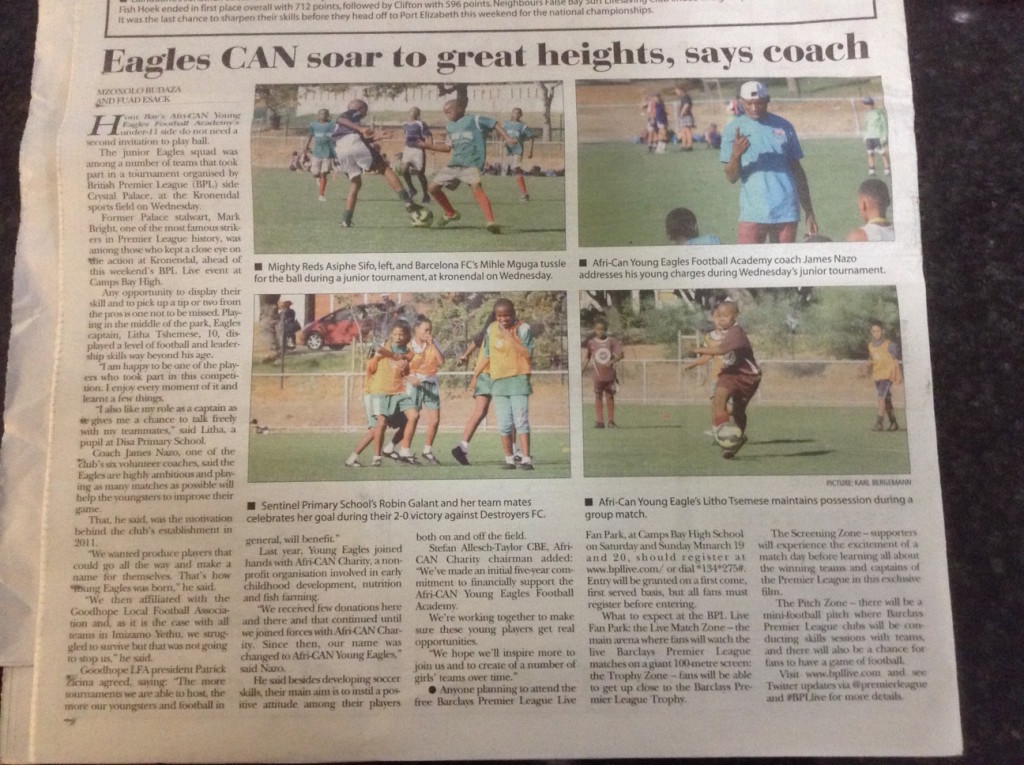In 2010 South Africa hosted the FIFA World Cup. 64 matches were played, Spain took the gold and the vuvuzela forced its way into the homes of millions globally. Now it’s 2016, Russia will host the next world cup, England still have no chance of winning and the sounds of the vuvuzela are becoming fainter and fainter. Yet, for the coaches and players at the Afri-CAN Young Eagles FC the sound of the (almost) trumpet still rings true. On Wednesday 16th March Afri-CAN Young Eagles took part in a youth tournament hosted by British Premier League side, the mighty Crystal Palace. Now before I brag about how well our boys did, about how proud the coaches were or about how we featured in the local papers because of our success let’s all remember that as always, it’s the taking part that counts.
No really. It does.
“I am happy to be one of the players…I enjoy every moment of it and I learnt a few things”.
Wise words from a wise leader. Litha Tshemese, the 10-year-old captain of the Under-12 squad couldn’t have put it better.
 (Afri-CAN Young Eagles feature on Sentinel News, a local newspaper in Hout Bay)
(Afri-CAN Young Eagles feature on Sentinel News, a local newspaper in Hout Bay)
We often get so het up on children’s development in the classroom and on exam results that we forget all about the lessons we learnt ourselves out in the fields, with bats and balls, playing in teams, playing with common goals, playing together. Sport at a young age helps all of us understand some of life’s harder lessons. From coming together as a team to learning how to deal with defeat, the ideas and concepts children are introduced to through sport have lasting effects on their adult lives.
Immediately, environments like these encourage children to work on social skills. Surrounded by their peers and working towards an objective together helps children work out how to handle those around them and how to figure out the delicate balance of teamwork. When encouragement is needed and when discipline is required is something we all strive for. There is nothing better than watching a team in full flow, reading each other ahead of time, silently knowing where the next pass needs to be made or how to block the oncoming attack and I firmly believe that the more time we all have learning how to work with other people the better off we all will be.
They will also be forced to start to deal with one of life’s tougher subjects, defeat. Sometimes the other team is better, for whatever reason, better trained, better rested or maybe it just wasn’t your day. Trace through your memories to that first defeat, that heartbreak, maybe you weren’t picked, maybe you lost in the final seconds or maybe, like me, you tripped on the starting line. That first defeat was horrible, I cried for days, but the lesson I learnt on that summer’s afternoon in 1998 at the St. Michaels Primary School Sports day has stuck with me forever. I can always fall and I can always try again. Personally, I’m glad I learnt that, with friends and family around me.
Technical ability is possibly the most obvious benefit from sports. Balance, hand-eye coordination and spatial awareness are skills that can’t be taught through theorising in the classroom. They must be lived. You never forget how to ride a bike and you never forget how to swim no matter how many years it’s been. Watch the Afri-CAN Young Eagles and you’ll see these skills being practiced daily, our coaches know their importance and practice makes perfect. Fitness and strength come with this, in unison working together to protect our children, improving cardiovascular functionality that gives a boost to the immune system. In the dangerous climate of Sub-Saharan Africa this is much needed.
I’ve always been fascinated by the power sport has to help children focus. It’s easy to be distracted at that young age by the world around you, particularly when living conditions are hard. Sport gives children an outlet for all the energy that youth supplies, it gives purpose. Is there a better way to instill a sense of passion and drive in our younger generations than in the tournaments hosted by teams like Crystal Palace. How better to show the advantages of ambition and focus than with academies like the Afri-CAN Young Eagles. If the kids don’t have somewhere to go and harness these traits in a positive light the world has already taught us they will find a path for them negatively.
If you want a child to learn how to read, give them a book. If you want a child to learn teamwork, give them a team. We wanted to do just that. So we made a team. Join us.

Author: Alex Harvey, Afri-CAN Copywriter
Bio: Alongside writing news posts for The Afri-CAN Charity,
he is also a barista at Department of Coffee & Social Affairs